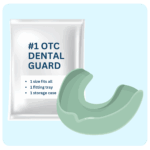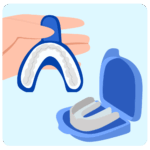What is a dental night guard used for? A dental night guard can prevent harmful teeth grinding and teeth clenching. Your Houston dentist can create a custom-fitting nightguard to protect your teeth from any Preemptive tooth pain! If you would like to learn more about teeth night guard, give us a call at (281) 638-9388 or book online today!
Dental night guards are plastic appliances intended to be worn during sleep and help prevent teeth from wearing down due to grinding. They are similar to mouth guards because they protect upper and lower teeth from trauma or nighttime grinding.
Dentists prescribe dental night guards to their patients for various reasons:
Do you grind your teeth at night? Prevent tooth injury and get your custom-made night guard for teeth.
Teeth grinding and clenching is not always a result of extreme anger as one might assume. It happens most often during the sleep but can also take place during the day. It is most likely to occur in stressful situations but can also be caused by other factors such as habits, nasal obstruction, or it can also occur involuntarily during sleep.
That is a very logical question. The preferred treatment is to eliminate and address the cause or the foundation of the issue, but sometimes treating the underlying causes can either be too complex or can be too expensive. Many people believe that teeth wear is a natural part of aging but what they don’t realize is that teeth wear is due to chronic stress and trauma being placed on the teeth from clinching and/or grinding. If teeth are not properly aligned then they can be hitting incorrectly, which causes unnecessary stresses on the teeth and its underlying bone. This can lead to severe teeth wear which can cause teeth to crack, need root canals, or extractions from vertical root fractures. Though nightguards do not treat the underlying causes of the teeth grinding or clinching, it is a great interim preventative method to prevent further damage to the teeth.
If you are a bruxir, that is, if you have the habit of clenching or grinding your teeth, you are likely to suffer from the following problems. Night guards will help avoid these issues:

Nightguards can aid with dental and jaw pains, snoring, teeth clenching, and teeth grinding.
You can get one of two types of night guards. You can purchase them from other another counter or have them custom-made using dental impressions or molds made in the dental office.

Over-the-Counter Night Guards
These are night guards readily available in most pharmacies or groceries. These are usually made to be a “fit-all” and, therefore, will rarely have a perfect, accurate fit for each person. These nightguards are soaked under warm water until they soften before the patient molds them to fit on their upper teeth. Although these are the least expensive, they are usually very thin and therefore not very strong or robust, therefore not recommended.

Custom-made Night Guards
Custom night guards are made specifically for your teeth because an impression or a mold of your upper and lower teeth is taken by your dentist, which is then sent to the dental laboratory to be fabricated. These Custom night guards have the most accurate fit and therefore are the most comfortable to wear. They are also the thickest and most rigid because they are made of hard acrylic material from the laboratory. This rigid nature ensures durability, longevity, and the most effective protection against bruxism.
Please remember that using night guards is not a treatment for the underlying cause of bruxism. They will simply act to reduce the effect of bruxism on your teeth and your smile. The actual cause of bruxism must be investigated by your dentist by studying your medical and dental history. Therefore, if you or any of your loved ones have a habit of teeth grinding or clenching, you should not take this matter lightly and take them to the dentist immediately. After all, a healthy smile is a beautiful smile!
Dental Night Guards are perfect for bruxism and teeth grinding, and they can help prevent mild external damage from sports and other events. However, night guards aren’t as powerful as mouth guards. If you engage in heavy sports and are concerned about dental damage from sporting injuries, you should consider getting a mouth guard instead.
Mouthguards are removable devices made of acrylic plastic that are fitted on the upper arch of your mouth to protect your teeth from damage from sporting events. Even though mouthguards are placed on the upper mouth, they are also designed to protect your lower teeth from damage. There are three different types of mouthguards — stock mouthguards, boil-and-bite mouthguards, and custom-made mouthguards. These mouthguards are made in different ways — some are designed just for your teeth, some are stock made, and you just have to wear them, and some need to be boiled and bitten into so they mold into your teeth shape.
Mouthguards are the ideal devices for those who engage in high-impact sports such as boxing, wrestling, football, baseball, cricket, skateboarding, etc. During these sports, the risk of injury is high. The mouth guard will protect your teeth from severe damage if you hit your mouth. However, it’s necessary to get a custom-fitted or boil-and-bite mouthguard from a reputable dental clinic so they can give you the perfect setting for your specific teeth. If you simply use a stock mouthguard, it may not protect every part of your teeth or be too loose or too tight, causing discomfort and inefficiency. The best part about mouthguards is that you can wear them over your braces. In fact, if you wear braces while playing sports, it’s even more important to use a mouth guard so the braces don’t hurt your gums or teeth upon impact.
So, dental night guards work moderately well against sporting injuries. However, if you engage in high-impact regular sports, you should instead use a mouthguard.
Houston | Katy | Montrose | West University Place | Greater Third Ward | Greater East End | North East Houston | Houston Heights | Central Northwest | Fairbanks | Acres Home | East Houston | Southeast Houston | Central Southwest | Fort Bend Houston | Brays Oaks | Meyerland Area | Sharpstown | Alief | Westchase | Memorial | Northwest Houston | Katyland | Whispering Lakes | Pine Lakes | Woodcreek Reserve
Visit us today at URBN Dental as a walk in patient or call us at 281-584-3123 for an appointment at a time of your choosing! Here is to permanent smiles and stronger teeth for all!
No Insurance? No problem.
© Copyright 2025 | Designed & SEO Optimized by The Doctors Marketing
Disclaimer: URBN Dental uses restorative materials such as Admira Fusion® by VOCO, which are free of BPA and Bis-GMA, and are not known to degrade into microplastics under normal oral conditions. While marketed as biocompatible and free of traditional plastic monomers, no dental material is guaranteed to be completely risk-free for all patients. This information is provided for educational purposes and does not constitute medical or regulatory advice.

Discover your perfect smile with a FREE Invisalign assessment.

Receive a complimentary 3D scan ($300 value) when you proceed with implant care.

Speak with our experts about your smile goals from the comfort of your home.
Discuss your smile goals with our experts—choose an in-office visit or a convenient 15-minute phone consult.

Quick, affordable care when you need it most.

Have questions about implants? Get personalized guidance in a brief phone call.